Against the backdrop of escalating concerns regarding antisemitism on American university campuses, a significant delegation from the University of Pennsylvania (UPenn) embarked on a solidarity visit to Tel Aviv University on January 4. The purpose of their visit was twofold: to express unwavering support for their Israeli counterparts and to gain profound insights into the aftermath of the harrowing events that transpired on October 7. The collaborative effort resulted in a joint symposium titled “October 7th: Coping with Trauma,” a comprehensive exploration of social, political, and psychological perspectives.
Prof. Michael Kahana, from the University of Pennsylvania, who initiated the
open letter in support of Israel and the current visit said: ‘In the weeks after October 7, we felt very distant in physical space, but very close in emotional space. I’m gratified that so many colleagues, many of whom I haven’t even met before joined me on this visit.”
“Together we’ll come out of this stronger.”— Michael Kahana, Edmund J. and Louise W. Kahn Term Professor of Psychology at the University of Pennsylvania
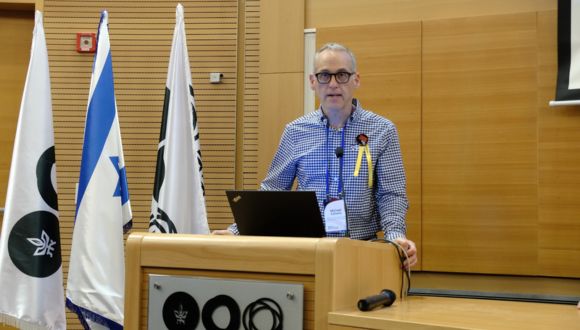 Michael Kahana, Edmund J. and Louise W. Kahn Term Professor of Psychology at the University of Pennsylvania
Michael Kahana, Edmund J. and Louise W. Kahn Term Professor of Psychology at the University of Pennsylvania
TAU President Ariel Porat thanked the UPenn delegation for their visit: “It’s important for us to have people like you come to us during these most difficult times ever because these days we need friends.
“Choosing to come shows support and empathy for people in Israel and Israeli universities.” TAU President Ariel Porat
TAU Rises to the Challenge
Addressing the challenges the university faced since the war’s inception, Ariel Porat explained that, immediately after October 7, up to one-third of undergraduates were called up for reserve duty. As a result, the academic year was postponed by more than two months and only started on December 31 to avoid losing the full academic year. Special provisions were instituted to aid reserve soldiers in completing their academic commitments while still being on active duty.
Beyond logistical challenges, potential tension between Jewish and Arab communities on campus posed an additional hurdle. TAU, committed to fostering a safe environment for all, undertook substantial efforts to ensure a smooth start to the academic year without incidents.
“We are sensitive to free speech, even when it collides with other values. Even in times of war, democracy, human rights and civil rights are not suspended,” commented President Porat.
Notably, TAU, unlike some other Israeli universities, refrained from expelling students expressing views related to the October 7th massacre without following proper legal procedures.
Navigating Trauma through Cinema
Renowned Israeli filmmaker Avi Nesher, drawing from his extensive experience, presented a unique perspective on trauma through the lens of cinema. Reflecting on two of his films, The Matchmaker and The Image of Victory, Nesher underscored cinema’s role in shaping a nation’s mythology and the imperative of acknowledging conflicting narratives.
The Matchmaker delves into the profound bond uniting the Israeli people, formed as a reaction to the Holocaust. Nesher highlighted the collective post-trauma stemming from the Holocaust, an ever-present yet unspoken force in the national psyche. The events of October 7, by reactivating this deep-seated trauma, resonated profoundly with the nation.
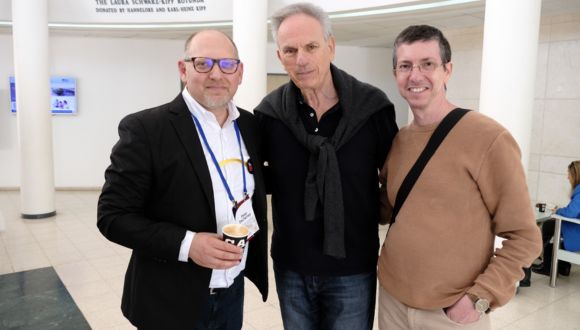 Professor Peter Decherney (UPenn), film director Avi Nesher, film scholar Dr Shmulik Duvdevani
Professor Peter Decherney (UPenn), film director Avi Nesher, film scholar Dr Shmulik Duvdevani
“We don’t want to think about ourselves as lamb to slaughter. Locked into a collective, locked into post-holocaust trauma, we’ll all emerge only as a collective.” — Avi Nesher, filmmaker
In The Image of Victory, which recounts the 1948 Egyptian raid on a kibbutz, Nesher weaves together opposing narratives. He argued that cinema’s power lies in compelling audiences to confront and ultimately acknowledge uncomfortable truths.
“If there are two conflicting narratives, the conflict can go on forever. Sympathy is possible when you honor the narrative you don’t agree with and learn to co-exist.”
Nesher added that the complete negation of the Israeli narrative witnessed on many university campuses felt like a major betrayal as universities are the first places where conflicting narratives should be embraced.
A Dive into the Background to the War
Prof Itamar Rabinovitch, former TAU President, ambassador to the US (1993-1996), and Visiting Professor at UPenn, Harvard, and Stanford, provided a succinct political analysis of the ongoing conflict. Describing the events of October 7 as the most severe crisis since the establishment of the state, he attributed the crisis to failures in politics, policy, intelligence, and military execution.
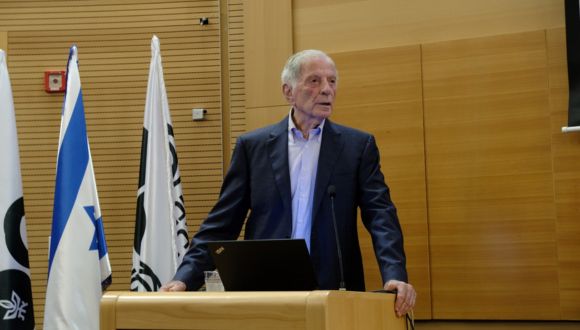 Prof Itamar Ravinovitch, former TAU President, ambassador to the US (1993-1996), and Visiting Professor at UPenn, Harvard, and Stanford
Prof Itamar Ravinovitch, former TAU President, ambassador to the US (1993-1996), and Visiting Professor at UPenn, Harvard, and Stanford
The internal divide in the country, exacerbated by attempts to weaken democracy, created an opportunity for adversaries. The policy to cultivate Hamas at the expense of the Palestinian Authority backfired, leading to a significant transfer of Qatari money into the hands of Hamas. Intelligence failures compounded the situation, resulting in a delayed response from the Israeli Defense Forces (IDF).
Prof Rabinovitch stressed that the current conflict is not merely a war with Gaza but represents the first war between Israel and Iran, with an uncertain resolution and future plans for Gaza.
However, the strength and resilience of the Israeli civil society inspire optimism about the future.
Understanding Trauma: Psychological and Social Dimensions
The symposium’s third panel, Perspectives on Trauma, provided a comprehensive examination of psychological and social dimensions. Prof Talma Hendler, the session moderator, highlighted the collective impact of the October 7 events on every individual in Israel, creating a shared sense of group trauma.
Prof. Bruria Adiri presented findings from a longitudinal study initiated post-attack, assessing distress and resilience across various social groups. Initial measurements in mid-October revealed unprecedented distress levels, gradually subsiding by November. Societal resilience exhibited a peak on October 23, marked by diverse groups coming together in solidarity. However, over time, societal resilience experienced a decline, while individual resilience continued to grow.
Factors influencing individual resilience included hope, community resilience, government support, and religiosity.
Higher vulnerability was noted among 30 to 40-year-olds, potentially attributed to heightened stressors related to finances, careers, family responsibilities, and uncertainty about the future.
Addressing Mental Health Challenges Post-Attack
Prof Gil Zaisman delved into mental health issues, outlining contributing factors to post-traumatic stress in the Israeli population. The October 7 attack, marked by extreme cruelty and sexual violence, triggered PTSD even in those not directly involved, exacerbated by the online dissemination of terrorist-recorded footage.
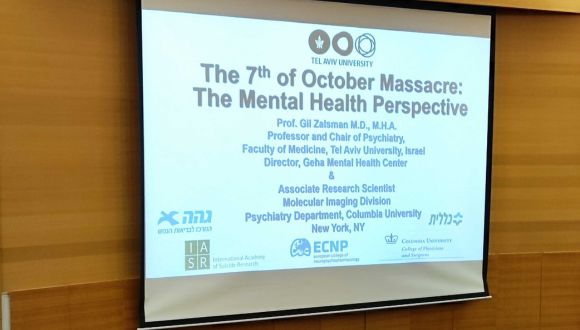
To counteract these effects, Israeli mental health professionals initiated various initiatives. Immediate victims were treated, and initiatives like the Regional Trauma Center, Daycare Unit for Sexual Victims, and Center for Children and Adolescents were established.
Additionally, Prof Yair Bar-Haim detailed the creation of the
National Center for PTSD at TAU, initially planned for late 2025. The unprecedented scale of the October 7 attack necessitated an accelerated timeline, with the center treating its first patients on January 1.
In addition to providing treatment for individuals affected by PTSD, researchers at TAU are actively working on preventative measures for soldiers. They employ software designed to train soldiers in directing their attention to potential threats, a method proven to substantially decrease the risk of developing PTSD. Following the events of October 7, a team led by Prof. Bar-Haim developed a dedicated app, which was subsequently distributed to the mobile phones of all soldiers in active combat units.
Gender Dynamics in the Aftermath of October 7
Prof Daphna Hacker, an expert on women studies and member of the UN Committee on the Elimination of Discrimination Against Women, explored the gender aspect of the war.
With Israel being the first and only country with mandatory military service for both men and women, 36% of TAU students called up for reserve duty are women, many of whom are engaged in active combat.
Notably, an all-female tank unit successfully repelled a Hamas attack on a kibbutz on October 7, fighting for an astounding 17 hours
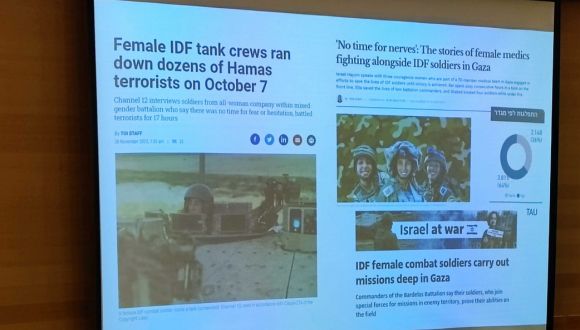
At the same time, many Israeli women and girls became victims of sexual violence on October 7. The shock over mass casualties initially prioritized victim identification and burial over forensic evidence collection, complicating international acknowledgment of the violence. To compound the issue, irresponsible domestic discourse about the scope of sexual violence has caused significant moral panic in Israel.
Another serious gender issue is the struggle to secure the release of hostages held by Hamas. The Red Cross has not been allowed to visit hostages, making it impossible to establish their health condition and to properly prioritize those who need to be released first.
All hostages, irrespective of their gender, should be brought home.
The final aspect Prof Hacker highlighted is the absence of women at the decision-making level, with all the crucial decisions on the war, ceasefire, hostage release and so on made by men.
In Gaza, where at least 50% of women report domestic violence, the devastating humanitarian crisis is the outcome of men’s actions and women are overrepresented only on the victim side.
Women are active in the struggle for peace – two Tel Aviv University professors established The Day after the War multidisciplinary academic action forum that calls on the Israeli government to declare that it has no intention of occupying Gaza and to join an international coalition that would force Hamas to surrender.
All those who live on this tiny piece of land on both sides of the disputed borders are traumatized by nationalism, militarism, religious fanaticism, and sexism.
Coping with Trauma: Captivity and Its Aftermath
Dr. Yael Lahav explored captivity trauma, emphasizing exposure to multiple stressors, including torture, sexual abuse, deprivation, and isolation. Homecoming for former hostages becomes a challenging transition, with difficulties in feeling safe and resuming normalcy amid destroyed homes and lost loved ones. The harsh realities faced by returning hostages contribute to long-term health issues, premature aging, and early mortality.
Moreover, secondary traumatization affects the family and friends of hostages, manifesting as PTSD symptoms. Dr. Lahav underscored the need for comprehensive mental health support and societal understanding to facilitate the reintegration of former hostages into daily life.
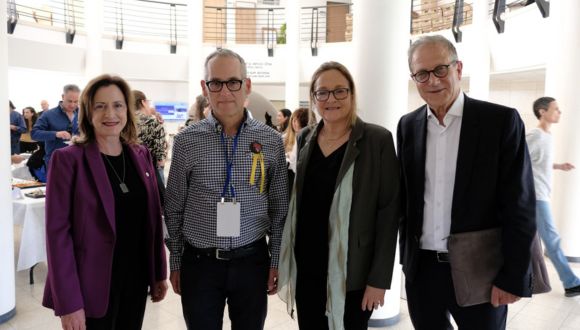 Prof Karen Avraham, Dean of the TAU Faculty of Medicine; Prof Michael Kahana, Edmund J. and Louise W. Kahn Term Professor of Psychology at the University of Pennsylvania; Prof Milette Shamir, TAU VP International; Prof Itzhak Fried, Professor-in-Residence, Neurosurgery, University of California Los Angeles
Prof Karen Avraham, Dean of the TAU Faculty of Medicine; Prof Michael Kahana, Edmund J. and Louise W. Kahn Term Professor of Psychology at the University of Pennsylvania; Prof Milette Shamir, TAU VP International; Prof Itzhak Fried, Professor-in-Residence, Neurosurgery, University of California Los Angeles
Academic Collaborations and Concerns
Milette Shamir, in concluding discussions, expressed concern over the rising wave of academic boycotts, particularly in social sciences, law, and humanities. While acknowledging supportive gestures, such as the EU postponing grant application deadlines for Israeli researchers, she stressed the importance of countering academic boycotts.
Members of the UPenn delegation expressed heartfelt support for their Israeli counterparts. They proposed ideas to expand research collaborations and study abroad opportunities for both American and Israeli students. Suggestions included summer programs, research internships, undergraduate scholarships, and joint projects, reflecting a commitment to strengthening academic ties amidst challenging times.
In essence, the UPenn solidarity visit to TAU served not only as a gesture of support but also as a platform for interdisciplinary discussions on trauma, resilience, and the collaborative pursuit of knowledge.
As both institutions navigate the complex aftermath of October 7, the shared commitment to academic collaboration stands as a testament to the enduring power of education and understanding in times of adversity.
 “It’s hard to believe that in a little while, five months will have passed since October 7th, a day that will forever be remembered as a terrible disaster for the State of Israel and the Jewish people”, Prof. Porat continued. “The terrible thing that happened that we feel both as a nation, as a country and individually is a pain that does not pass with time, it only grows during this period. If there is a need for a painful reminder, we receive it every day. We all hope for the return of the captives and the recovery of the wounded, and the cessation of soldiers dying in battle. This grove is dedicated to the murdered and fallen, but it also contains a certain sign of hope for the return of the captives”.
“It’s hard to believe that in a little while, five months will have passed since October 7th, a day that will forever be remembered as a terrible disaster for the State of Israel and the Jewish people”, Prof. Porat continued. “The terrible thing that happened that we feel both as a nation, as a country and individually is a pain that does not pass with time, it only grows during this period. If there is a need for a painful reminder, we receive it every day. We all hope for the return of the captives and the recovery of the wounded, and the cessation of soldiers dying in battle. This grove is dedicated to the murdered and fallen, but it also contains a certain sign of hope for the return of the captives”.
 As Prof. Porat planted the first tree in the avenue, a solemn atmosphere took hold, carrying with it a firm commitment to never forget the sacrifices made.
Miriam Haber shared her son’s, Zechariah Pesach’s, pursuits. Zechariah Pesach (RIP) had fallen in battle in Gaza on January 16th. Zechariah fell at the age of 32 and was a very dedicated husband and father to three young children. “The main thing about his fall is a heavy personal loss to his family and friends, but not only that. Zechariah’s choice in the field of plant health and his research topic – Wheat Cultivation Under Stress Conditions, stemmed from his deep love for the land of Israel, the ground of Israel, and all humanity. He chose to help with food security due to the difficult climate changes affecting the earth. We are convinced that his colleagues at TAU will continue to fulfill his scientific dreams”, said Miriam, moving the audience present at the ceremony, with the planting of a tree in memory of her son.
As Prof. Porat planted the first tree in the avenue, a solemn atmosphere took hold, carrying with it a firm commitment to never forget the sacrifices made.
Miriam Haber shared her son’s, Zechariah Pesach’s, pursuits. Zechariah Pesach (RIP) had fallen in battle in Gaza on January 16th. Zechariah fell at the age of 32 and was a very dedicated husband and father to three young children. “The main thing about his fall is a heavy personal loss to his family and friends, but not only that. Zechariah’s choice in the field of plant health and his research topic – Wheat Cultivation Under Stress Conditions, stemmed from his deep love for the land of Israel, the ground of Israel, and all humanity. He chose to help with food security due to the difficult climate changes affecting the earth. We are convinced that his colleagues at TAU will continue to fulfill his scientific dreams”, said Miriam, moving the audience present at the ceremony, with the planting of a tree in memory of her son.
 Miriam Haber speaking to campus members.
Miriam Haber speaking to campus members.
 Our hearts are always with the families of the fallen and the captives, and we all hope that they will all soon return to us in peace.
Our hearts are always with the families of the fallen and the captives, and we all hope that they will all soon return to us in peace.







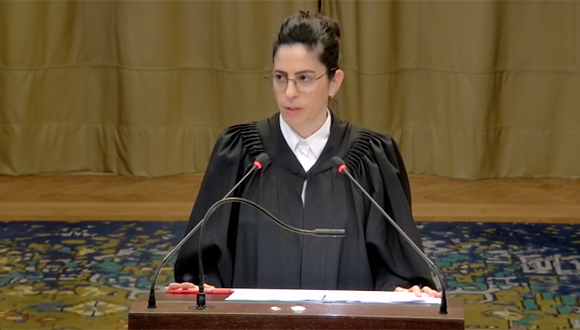 Dr. Galit Raguan, an alumna of Tel Aviv University and a member of Israel’s legal delegation. (Image courtesy of the ICJ. All rights reserved)
While a final resolution on the case is expected to take years, South Africa has requested that, in the interim, the ICJ make
Dr. Galit Raguan, an alumna of Tel Aviv University and a member of Israel’s legal delegation. (Image courtesy of the ICJ. All rights reserved)
While a final resolution on the case is expected to take years, South Africa has requested that, in the interim, the ICJ make 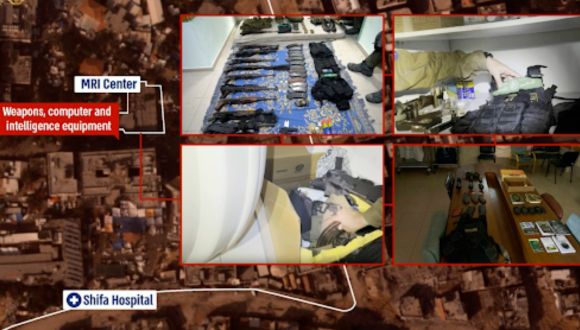 As presented by Israel’s legal team in court, the IDF found Hamas intelligence information and multiple weapons caches at Gaza’s Shifa Hospital, including in the MRI Center. (Image courtesy of the ICJ. All rights reserved)
Raguan also outlined the role of the IDF’s dedicated military unit Coordination of Government Activities in the Territories (COGAT), which oversees border crossings from Israel and works with the United Nations (UN) and other international organizations to facilitate the entry of humanitarian aid into Gaza. Despite an attack on COGAT on October 7, Raguan said the unit has extended its operating hours at both the Kerem Shalom and Rafah crossings to receive more humanitarian goods.
Raguan also said the unit has assisted with establishing four field hospitals and two floating hospitals, getting new ambulances into Gaza and the coordination of air drops. She highlighted how humanitarian assistance continues and that no limitations have been posed, even though “Hamas is regularly stealing aid at the expense of its own population.”
As presented by Israel’s legal team in court, the IDF found Hamas intelligence information and multiple weapons caches at Gaza’s Shifa Hospital, including in the MRI Center. (Image courtesy of the ICJ. All rights reserved)
Raguan also outlined the role of the IDF’s dedicated military unit Coordination of Government Activities in the Territories (COGAT), which oversees border crossings from Israel and works with the United Nations (UN) and other international organizations to facilitate the entry of humanitarian aid into Gaza. Despite an attack on COGAT on October 7, Raguan said the unit has extended its operating hours at both the Kerem Shalom and Rafah crossings to receive more humanitarian goods.
Raguan also said the unit has assisted with establishing four field hospitals and two floating hospitals, getting new ambulances into Gaza and the coordination of air drops. She highlighted how humanitarian assistance continues and that no limitations have been posed, even though “Hamas is regularly stealing aid at the expense of its own population.”
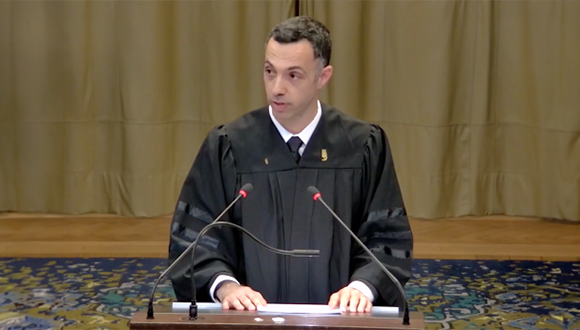 Dr. Omri Sender, an alumnus of Tel Aviv University and a member of Israel’s legal delegation. (Image courtesy of the ICJ. All rights reserved)
Sender noted that, before the war, approximately 70 trucks carrying food entered Gaza every day, whereas in the first two weeks of January 109 trucks entered each day. He also highlighted that the amount of cooking gas entering Gaza had doubled to 90 tons per day since December 21; moreover, since December 8, the amount of fuel entering Gaza had also doubled and now meets the target requested by the UN: 180,000 liters per day.
Sender also pointed to the fact that the hostilities in Gaza are winding down, and he stated that Israel has already started to transition to a phase with fewer ground troops and less intense fighting.
Furthermore, as argued by team lead Prof. Malcolm Shaw KC, South Africa also failed to effectively illustrate Israel’s intent to commit genocide. Given the case is at the provisional measures phase, genocidal acts do not have to be proven; demonstrating plausible intent would be enough for the court to intervene. However, as Shaw contended, to do this one must directly link any potential utterance or statement to on-the-ground policy. In this, South Africa failed, Shaw argued.
Dr. Omri Sender, an alumnus of Tel Aviv University and a member of Israel’s legal delegation. (Image courtesy of the ICJ. All rights reserved)
Sender noted that, before the war, approximately 70 trucks carrying food entered Gaza every day, whereas in the first two weeks of January 109 trucks entered each day. He also highlighted that the amount of cooking gas entering Gaza had doubled to 90 tons per day since December 21; moreover, since December 8, the amount of fuel entering Gaza had also doubled and now meets the target requested by the UN: 180,000 liters per day.
Sender also pointed to the fact that the hostilities in Gaza are winding down, and he stated that Israel has already started to transition to a phase with fewer ground troops and less intense fighting.
Furthermore, as argued by team lead Prof. Malcolm Shaw KC, South Africa also failed to effectively illustrate Israel’s intent to commit genocide. Given the case is at the provisional measures phase, genocidal acts do not have to be proven; demonstrating plausible intent would be enough for the court to intervene. However, as Shaw contended, to do this one must directly link any potential utterance or statement to on-the-ground policy. In this, South Africa failed, Shaw argued.
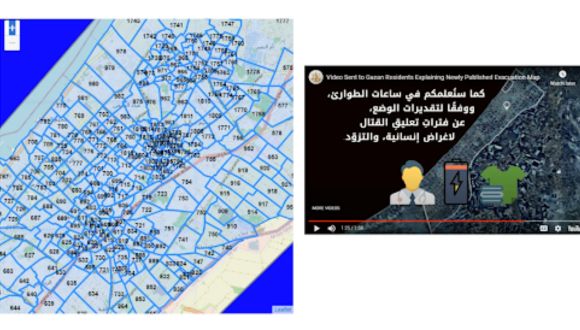 A map of evacuation zones created by the IDF to assist with civilian safety was shared in court, along with a screenshot of an instructional video in Arab of how to use the map (Image courtesy of the ICJ. All rights reserved)
To further support this claim, Shaw also provided evidence of daily IDF operational directives that, in accordance with international law and contradicting South Africa’s case, prioritize mitigating harm to and punishment of civilians.
A map of evacuation zones created by the IDF to assist with civilian safety was shared in court, along with a screenshot of an instructional video in Arab of how to use the map (Image courtesy of the ICJ. All rights reserved)
To further support this claim, Shaw also provided evidence of daily IDF operational directives that, in accordance with international law and contradicting South Africa’s case, prioritize mitigating harm to and punishment of civilians.
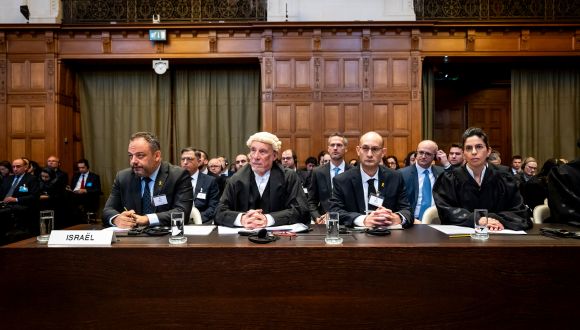 Members of Israel’s legal delegation at the International Court of Justice. (credit: UN Photo/ICJ-CIJ/Frank van Beek. Courtesy of the ICJ. All rights reserved)
Moreover, the general omission of Hamas from South Africa’s case was something, the Israel team argued, that demonstrated a high level of prejudice:
Members of Israel’s legal delegation at the International Court of Justice. (credit: UN Photo/ICJ-CIJ/Frank van Beek. Courtesy of the ICJ. All rights reserved)
Moreover, the general omission of Hamas from South Africa’s case was something, the Israel team argued, that demonstrated a high level of prejudice:

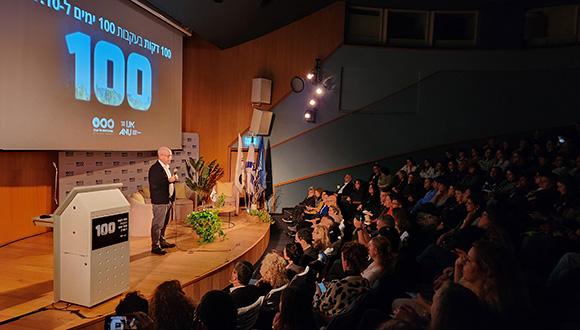
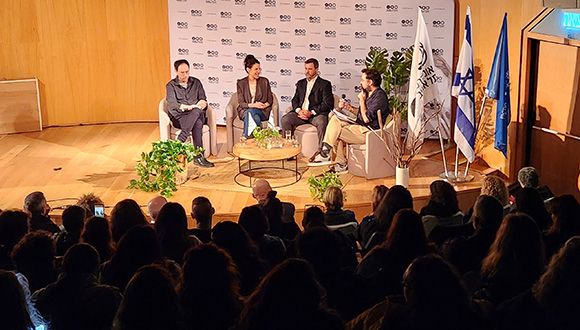
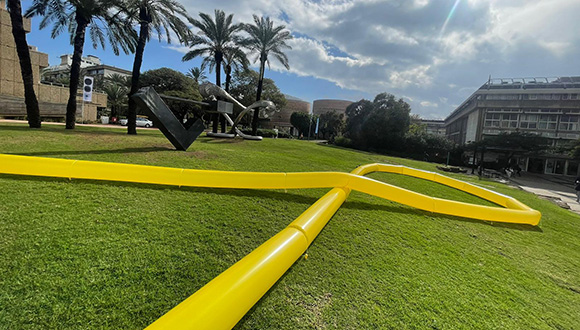

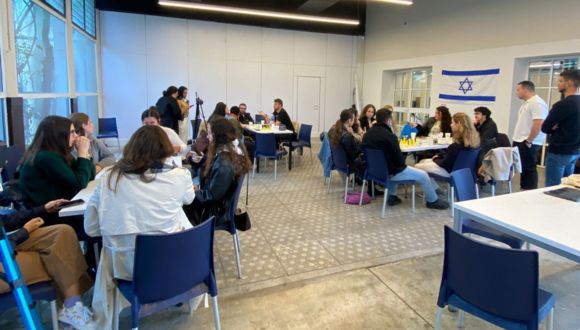
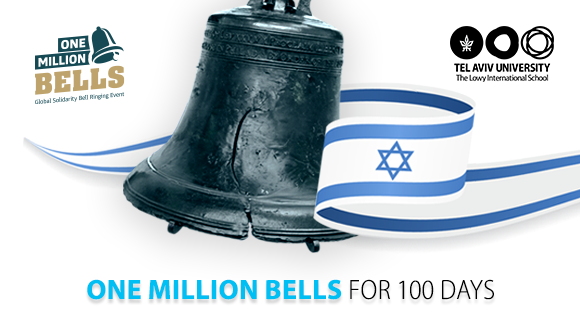 As Dr. Inon Schenker, Initiative Creator, explains: “Bells have been a powerful tool for centuries. One bell can warn of danger and save a village; One million bells may shake the world, herald hope and mark a line between humanity and evil. October 7th, 2024 must be remembered globally as a defining moment against terror.”
As Dr. Inon Schenker, Initiative Creator, explains: “Bells have been a powerful tool for centuries. One bell can warn of danger and save a village; One million bells may shake the world, herald hope and mark a line between humanity and evil. October 7th, 2024 must be remembered globally as a defining moment against terror.”
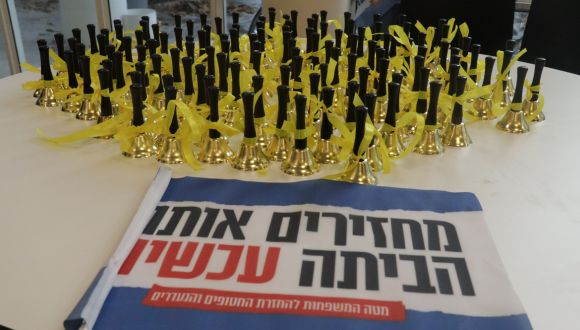 TAU Rector Prof. Mark Shtaif extended his heartfelt condolences to the families of all the war casualties and expressed sincere hope for the swift release of the hostages and a resolution to the conflict.
Tal, a representative from the Hostage Forum, underscored the urgency of advocating for the prompt liberation of hostages. American actress and performer Jade Taylor sang at the event, accompanied by Ido Montaniez.
TAU Rector Prof. Mark Shtaif extended his heartfelt condolences to the families of all the war casualties and expressed sincere hope for the swift release of the hostages and a resolution to the conflict.
Tal, a representative from the Hostage Forum, underscored the urgency of advocating for the prompt liberation of hostages. American actress and performer Jade Taylor sang at the event, accompanied by Ido Montaniez.
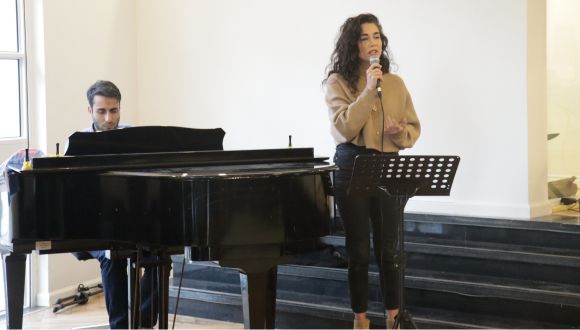 Ido Montaniez and Jade Taylor at the Lowy International School
Partners of the One Million Bells initiative included the Israeli Ministry of Foreign Affairs, World Zionist Organization, Center for Jewish Impact, major hotel chains, the Stock Exchange, United Nations for Israel, Impact for Healthy Future, NOVA, and global faith organizations.
Ido Montaniez and Jade Taylor at the Lowy International School
Partners of the One Million Bells initiative included the Israeli Ministry of Foreign Affairs, World Zionist Organization, Center for Jewish Impact, major hotel chains, the Stock Exchange, United Nations for Israel, Impact for Healthy Future, NOVA, and global faith organizations.

 Michael Kahana, Edmund J. and Louise W. Kahn Term Professor of Psychology at the University of Pennsylvania
TAU President Ariel Porat thanked the UPenn delegation for their visit: “It’s important for us to have people like you come to us during these most difficult times ever because these days we need friends.
Michael Kahana, Edmund J. and Louise W. Kahn Term Professor of Psychology at the University of Pennsylvania
TAU President Ariel Porat thanked the UPenn delegation for their visit: “It’s important for us to have people like you come to us during these most difficult times ever because these days we need friends.
 Professor Peter Decherney (UPenn), film director Avi Nesher, film scholar Dr Shmulik Duvdevani
Professor Peter Decherney (UPenn), film director Avi Nesher, film scholar Dr Shmulik Duvdevani
 Prof Itamar Ravinovitch, former TAU President, ambassador to the US (1993-1996), and Visiting Professor at UPenn, Harvard, and Stanford
The internal divide in the country, exacerbated by attempts to weaken democracy, created an opportunity for adversaries. The policy to cultivate Hamas at the expense of the Palestinian Authority backfired, leading to a significant transfer of Qatari money into the hands of Hamas. Intelligence failures compounded the situation, resulting in a delayed response from the Israeli Defense Forces (IDF).
Prof Rabinovitch stressed that the current conflict is not merely a war with Gaza but represents the first war between Israel and Iran, with an uncertain resolution and future plans for Gaza.
Prof Itamar Ravinovitch, former TAU President, ambassador to the US (1993-1996), and Visiting Professor at UPenn, Harvard, and Stanford
The internal divide in the country, exacerbated by attempts to weaken democracy, created an opportunity for adversaries. The policy to cultivate Hamas at the expense of the Palestinian Authority backfired, leading to a significant transfer of Qatari money into the hands of Hamas. Intelligence failures compounded the situation, resulting in a delayed response from the Israeli Defense Forces (IDF).
Prof Rabinovitch stressed that the current conflict is not merely a war with Gaza but represents the first war between Israel and Iran, with an uncertain resolution and future plans for Gaza.
 To counteract these effects, Israeli mental health professionals initiated various initiatives. Immediate victims were treated, and initiatives like the Regional Trauma Center, Daycare Unit for Sexual Victims, and Center for Children and Adolescents were established.
Additionally, Prof Yair Bar-Haim detailed the creation of the
To counteract these effects, Israeli mental health professionals initiated various initiatives. Immediate victims were treated, and initiatives like the Regional Trauma Center, Daycare Unit for Sexual Victims, and Center for Children and Adolescents were established.
Additionally, Prof Yair Bar-Haim detailed the creation of the  At the same time, many Israeli women and girls became victims of sexual violence on October 7. The shock over mass casualties initially prioritized victim identification and burial over forensic evidence collection, complicating international acknowledgment of the violence. To compound the issue, irresponsible domestic discourse about the scope of sexual violence has caused significant moral panic in Israel.
Another serious gender issue is the struggle to secure the release of hostages held by Hamas. The Red Cross has not been allowed to visit hostages, making it impossible to establish their health condition and to properly prioritize those who need to be released first.
At the same time, many Israeli women and girls became victims of sexual violence on October 7. The shock over mass casualties initially prioritized victim identification and burial over forensic evidence collection, complicating international acknowledgment of the violence. To compound the issue, irresponsible domestic discourse about the scope of sexual violence has caused significant moral panic in Israel.
Another serious gender issue is the struggle to secure the release of hostages held by Hamas. The Red Cross has not been allowed to visit hostages, making it impossible to establish their health condition and to properly prioritize those who need to be released first.
 Prof Karen Avraham, Dean of the TAU Faculty of Medicine; Prof Michael Kahana, Edmund J. and Louise W. Kahn Term Professor of Psychology at the University of Pennsylvania; Prof Milette Shamir, TAU VP International; Prof Itzhak Fried, Professor-in-Residence, Neurosurgery, University of California Los Angeles
Prof Karen Avraham, Dean of the TAU Faculty of Medicine; Prof Michael Kahana, Edmund J. and Louise W. Kahn Term Professor of Psychology at the University of Pennsylvania; Prof Milette Shamir, TAU VP International; Prof Itzhak Fried, Professor-in-Residence, Neurosurgery, University of California Los Angeles



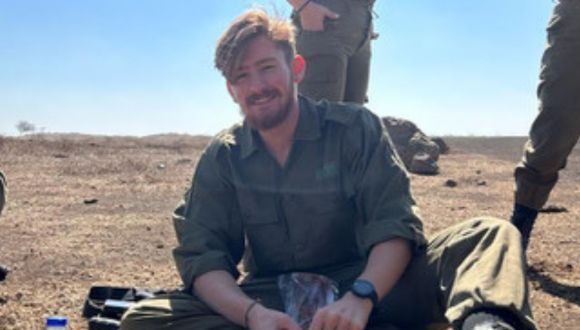 Yishai Stern (Photo courtesy of Yishai Stern)
Yishai explains, “Now that some time has passed since the start of the war, soldiers mostly have everything they need, so our care packages are more about extras—to show extra love.
Yishai Stern (Photo courtesy of Yishai Stern)
Yishai explains, “Now that some time has passed since the start of the war, soldiers mostly have everything they need, so our care packages are more about extras—to show extra love.